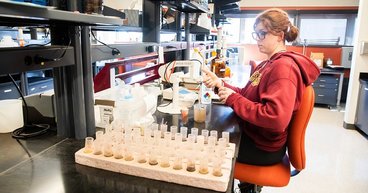
Soaring soil stats
The Soil Testing and Research Analytical Laboratory (STRAL) tested a record-breaking number of regular and special samples in 2023
Taylor Swift, Prince Harry, and Barbie weren’t the only things topping the charts in 2023. At the Soil Testing and Research Analytical Laboratory (STRAL) on the University of Minnesota’s Twin Cities campus in St. Paul, researchers analyzed a record-breaking 7,015 regular soil samples — topping the previous total by 736, an increase of almost 12 percent. The STRAL also beat its record for special soil samples by five, an increase of 0.1 percent.

Scientists at the STRAL provide quality analyses to U of M researchers, state and federal agencies, private companies, and the general public. “Regular series” soil tests from the public account for a fifth of the soil samples the STRAL processes. Regular tests include phosphorus, potassium, pH, percent organic matter, estimated texture, liming recommendation if needed, and NPK (nitrogen, phosphorus, and potassium) recommendation.
The “specials” include any test that isn’t classified as “regular,” such as soluble salts, nitrate, lead, boron, sulfate, calcium, magnesium, iron, zinc, copper, and manganese.
In an average year, the STRAL receives around 25,000 samples and runs 75,000 analyses, generating nearly one million data points. Now that’s a lot of dirt — almost as much as you’d find in the celebrity gossip columns!
Soil testing is available to the public year round. For more information about soil testing, visit the Soil Testing Laboratory and the Research Analytical Laboratory.





